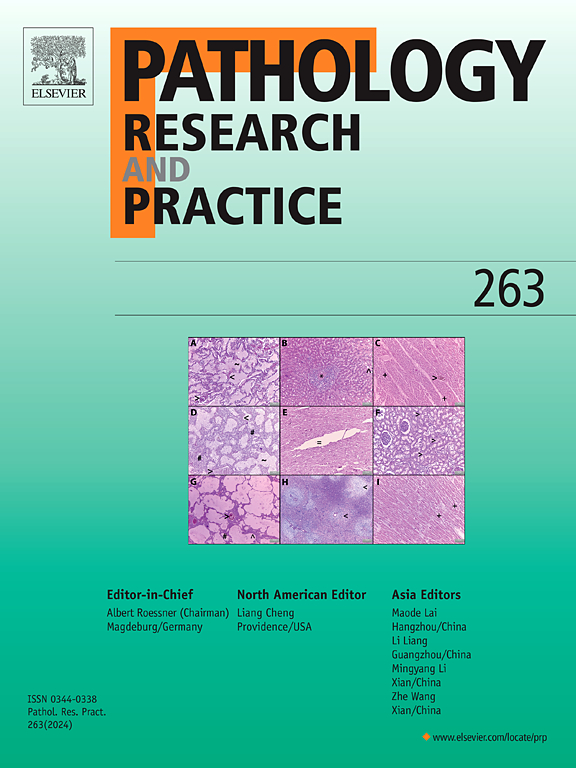METTL1 drives glioma progression by promoting N7-methylguanosine (m7G) modification of glycolysis-related enzyme PGK1
IF 3.2
4区 医学
Q2 PATHOLOGY
引用次数: 0
Abstract
Glioma is a common brain malignancy with a poor prognosis. N7-methylguanosine (m7G) modification is involved in cancer progression, and methyltransferase 1 (METTL1) is a m7G methyltransferase. Here, we aimed to study the role of METTL1 in glioma and the potential mechanism. The proliferation of glioma cells was evaluated using cell counting kit-8 and 5-ethynyl-2’-deoxyuridine (EdU) assays, and the glycolysis was assessed using glucose uptake and lactate content kits and seahorse analysis. The regulation of METTL1 on phosphoglycerate kinase 1 (PGK1) was analyzed using methylated RNA immunoprecipitation, RNA immunoprecipitation, quantitative real-time polymerase chain reaction, western blotting, and RNA stability assay. The results showed that METTL1 expression was upregulated in glioma tissues and cells. Silencing of METTL1 inhibited the proliferation and glycolysis of glioma cells and impeded tumor growth in mice. Moreover, METTL1 knockdown suppressed internal m7G modification of PGK1 and decreased its half-life. PGK1 overexpression counteracted the inhibition of glioma cell proliferation and glycolysis induced by METTL1 knockdown. In conclusion, METTL1 functions as an oncogene to accelerate glioma progression by promoting m7G modification of PGK1, providing a potential therapeutic target for glioma.
METTL1通过促进糖酵解相关酶PGK1的n7 -甲基鸟苷(m7G)修饰来驱动胶质瘤进展
胶质瘤是一种常见的脑恶性肿瘤,预后较差。n7 -甲基鸟苷(m7G)修饰参与癌症进展,甲基转移酶1 (METTL1)是m7G甲基转移酶。在此,我们旨在研究METTL1在胶质瘤中的作用及其潜在机制。采用细胞计数试剂盒-8和5-乙基-2 ' -脱氧尿苷(EdU)检测评估胶质瘤细胞的增殖,采用葡萄糖摄取和乳酸含量检测试剂盒和海马分析评估糖酵解。采用甲基化RNA免疫沉淀、RNA免疫沉淀、实时定量聚合酶链反应、western blotting和RNA稳定性实验分析METTL1对磷酸甘油酸激酶1 (PGK1)的调控作用。结果显示,METTL1在胶质瘤组织和细胞中表达上调。沉默METTL1抑制胶质瘤细胞的增殖和糖酵解,抑制小鼠肿瘤生长。此外,METTL1敲除抑制了PGK1内部m7G修饰,缩短了其半衰期。PGK1过表达可抵消METTL1敲低对胶质瘤细胞增殖和糖酵解的抑制作用。综上所述,METTL1作为癌基因通过促进PGK1的m7G修饰加速胶质瘤的进展,为胶质瘤提供了一个潜在的治疗靶点。
本文章由计算机程序翻译,如有差异,请以英文原文为准。
求助全文
约1分钟内获得全文
求助全文
来源期刊
CiteScore
5.00
自引率
3.60%
发文量
405
审稿时长
24 days
期刊介绍:
Pathology, Research and Practice provides accessible coverage of the most recent developments across the entire field of pathology: Reviews focus on recent progress in pathology, while Comments look at interesting current problems and at hypotheses for future developments in pathology. Original Papers present novel findings on all aspects of general, anatomic and molecular pathology. Rapid Communications inform readers on preliminary findings that may be relevant for further studies and need to be communicated quickly. Teaching Cases look at new aspects or special diagnostic problems of diseases and at case reports relevant for the pathologist''s practice.

 求助内容:
求助内容: 应助结果提醒方式:
应助结果提醒方式:


